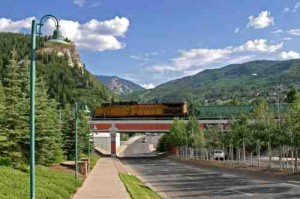Brief by Central Staff
Water – October 2006 – Colorado Central Magazine
A 2003 agreement between the state and federal governments concerning streamflows through the Black Canyon of the Gunnison National Park has been set aside by a federal judge, who called it “arbitrary, capricious, and an abuse of discretion.”
The issue goes back to 1933, when President Herbert Hoover reserved some federal land between Gunnison and Montrose as Black Canyon of the Gunnison National Monument.
Under a legal ruling known as the Winters Doctrine, when the federal government reserves land for a given purpose, it is also presumed to be seeking a state water right at that time to serve that purpose.
For example, if an Indian reservation was established in 1881, and the idea was for the tribe to practice irrigated agriculture on 10,000 acres, then an 1881 water right would be established for water sufficient to irrigate that acreage. If crops there typically needed three feet of water, then the 1881 water right would be for 30,000 acre-feet.
In the case of the Black Canyon, the idea was to preserve its natural state, which means high stream flows every so often to scour dead foliage, tree limbs, sand bars, and other unnatural results of controlled low flows.
The Black Canyon’s implied water right had never been formally quantified in a state water court, but in the 2003 agreement, the federal Department of the Interior settled for a year-round minimum flow of 300 cubic feet per second, with occasional scouring flows as the climate and storage needs permitted.
Several environmental groups sued in federal court to block the agreement, and on Sept. 13, U.S. District Judge Clarence Brimmer said the Interior Department should have looked at its own scientific studies, which indicated that an annual peak flow of 10,000 cfs was necessary to preserve Black Canyon’s natural environment.
Brimmer said that in the agreement, the Interior Department relinquished significant federal water rights, making it an unlawful disposition of federal property.
What happens next?
An appeal is almost a certainty. If Brimmer’s ruling is upheld, it means that some water now stored upstream in the Aspinall Unit reservoirs (Blue Mountain, Morrow Point, and Crystal) will have to be released to flow through the Black Canyon of the Gunnison National Park.
That will help Colorado meet its Colorado River Compact obligation to downstream states. But it could also mean reduced power generationon, as well as lower reservoir levels at popular recreation sites, and less of a storage pool to attract thirsty Front Range cities.


